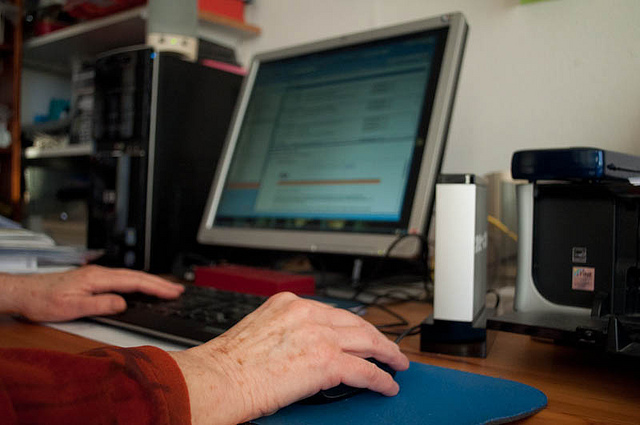English computer vocabulary Posted by Gabriele on Jun 14, 2016 in English Vocabulary

Image by Wies van Erp on Flickr.com licensed under CC BY 2.0.
Computers are a big part of our everyday lives – at work, at home, out shopping…we encounter them everywhere. You are likely on one right now! It is certainly a good idea to know the names for different parts of the computer, for many reasons, but especially if you have a problem and need something fixed.
Here is some common English computer vocabulary for you. I’ve also included common verbs associated with using computers. If you have questions about something that is not in this list, just let me know with a comment below.
desktop computer – a personal computer that sits on desk (even though some parts may be under the desk or table); this is the traditional personal computer
keyboard – a set of typewriter-like keys, made up of letters, numbers, and symbols that are used to enter information into a computer
laptop – a small portable computer that you can easily and conveniently move from place to place; usually laptops fold down flat so that the screen and keyboard are protected and so the laptop can fit in a backpack or briefcase
modem – a device that enables a computer to send data or information out to other devices through telephone or cable lines
monitor – the visual display screen of the computer; where you look to get information from a computer
mouse – a hand-operated electronic device that is used to controls the arrow or “cursor” on the computer screen; like the keyboard the mouse is an external way for controlling what you want to have happen in the computer
port – this is a connection point on a computer, where external devices can be connected to the computer; ports include the places where you connect USBs, CDs, or DVDs as well as connection points for printers or the mouse
touchpad – a small panel that is touch-sensitive and used like a mouse to control the arrow or cursor in a computer; these are usually found on laptops
tower – the part of the computer that contains the majority of the electrical circuitry that runs a computer; generally this is a tall thin enclosure where the power button for the computer is found
Common verbs used when computing:
to drag and drop – to move something (a document or picture) from one part of the computer screen to another part
to cut and paste – to remove text from one area in a written document and move it to another area in the document
to freeze – to stop responding; this is when the computer screen won’t move/change no matter what you do
to upload – to transfer or bring data from one computer device or file to another
to download – to copy data from one computer system to another; usually people download information from the Internet to their computer
to click – to press a button on a mouse or a touchpad in order to select something on the screen
to log on/to log in – to enter a username and password in order to have access to a certain area in a computer or online

Build vocabulary, practice pronunciation, and more with Transparent Language Online. Available anytime, anywhere, on any device.
About the Author: Gabriele
Hi there! I am one of Transparent Language's ESL bloggers. I am a 32-year-old native English speaker who was born and raised in the United States. I am living in Washington, DC now, but I have lived all over the US and also spent many years living and working abroad. I started teaching English as a second language in 2005 after completing a Master's in Applied Linguists and a Certificate in English Language Teaching to Adults' (CELTA). Since that time I have taught ESL in the United States at the community college and university level. I have also gone on to pursue my doctorate in psychology and now I also teach courses in psychology. I like to stay connected to ESL learners around the world through Transparent Languages ESL Blog. Please ask questions and leave comments on the blog and I will be sure to answer them.



